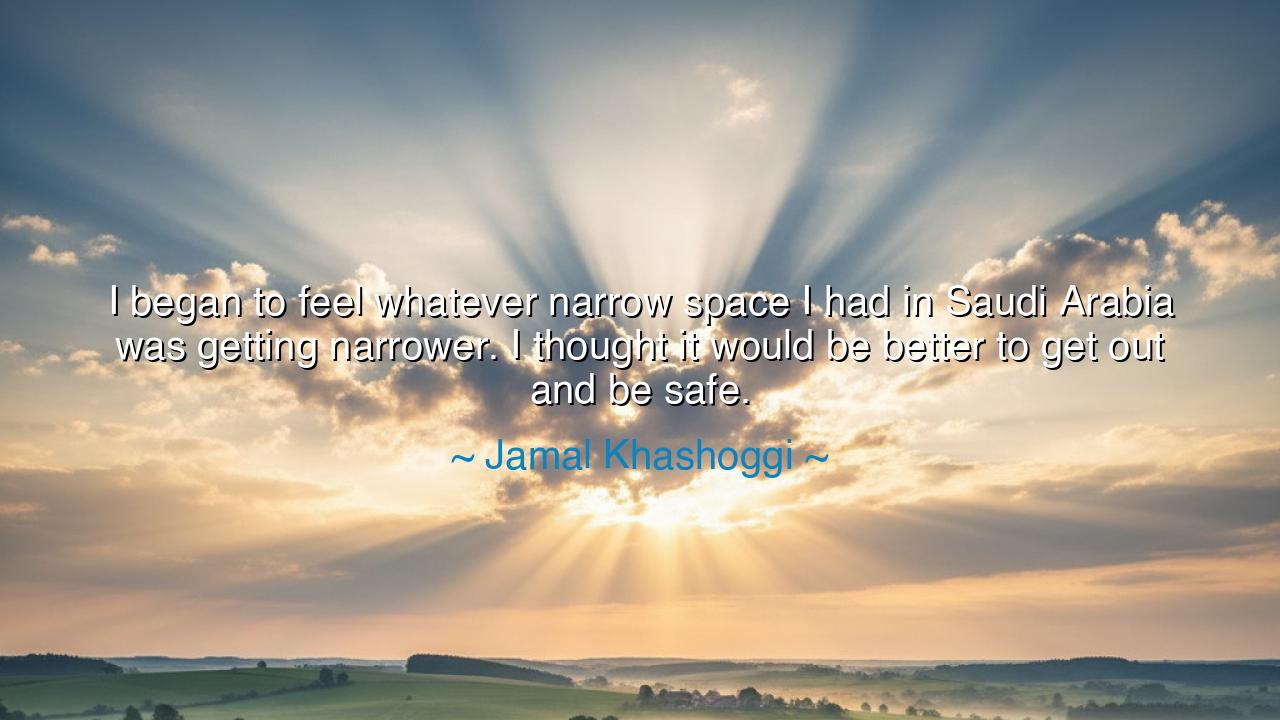
I began to feel whatever narrow space I had in Saudi Arabia was
I began to feel whatever narrow space I had in Saudi Arabia was getting narrower. I thought it would be better to get out and be safe.






Hear the sorrowful yet courageous voice of Jamal Khashoggi, who spoke these words before his death: “I began to feel whatever narrow space I had in Saudi Arabia was getting narrower. I thought it would be better to get out and be safe.” This is not merely the lament of one man, but the cry of every soul that yearns for truth yet finds itself crushed beneath the walls of tyranny. His testimony is a witness to the fragility of freedom in lands where power seeks to silence conscience, and a reminder that space—the room to think, to write, to live—is as necessary to the soul as breath is to the body.
The space Khashoggi speaks of is not the space of stone houses or desert sands, but the spiritual and civic space of expression, thought, and dissent. It is the space in which a man may question without fear, may dream without chains, may speak without the shadow of death at his door. Yet when rulers grow fearful of truth, they make this space ever smaller, suffocating voices until silence reigns. For a time, the brave endure, speaking with careful words, weaving truth into narrow channels. But when even those channels close, exile becomes the last refuge of freedom.
History has shown us this pattern many times. Recall the fate of Socrates in ancient Athens. Though Athens was called the cradle of democracy, its tolerance proved fragile when Socrates challenged the illusions of the powerful. His space to speak grew ever narrower, until at last he was condemned to death by the very city he sought to enlighten. Like Khashoggi, he faced the suffocation of truth; unlike Khashoggi, he chose not exile, but martyrdom, drinking the hemlock rather than abandoning his principles. The message of both men is the same: truth cannot live without space.
Khashoggi’s words echo too in the story of the Hebrew prophets, who were driven into wilderness or slain by kings when they dared to call out corruption. They too found their space shrinking as rulers hardened their hearts. Yet their voices, though stifled in their time, thundered across centuries. So too with Khashoggi: though silenced by violence, his testimony resounds beyond the grave, reminding the world that when free thought is murdered, it does not die—it multiplies.
The meaning of his words is both tragic and heroic. They tell us that freedom is not guaranteed; it is fragile, like a flame that can be smothered if men cease to protect it. They also tell us that the longing for safety is not cowardice, but wisdom, for survival itself is a form of resistance when the truth must continue to be spoken. Khashoggi sought exile not to abandon his voice, but to preserve it, to keep speaking in the hope that the world would hear. His choice reflects the eternal struggle between silence imposed by fear and speech born of courage.
The lesson for us is this: guard the space of freedom wherever you find it, and do not wait until it grows narrow to cherish it. Do not scorn those who flee oppression, for in fleeing they often preserve the truth for another day. And do not be deceived into thinking that freedom, once won, can never be lost. The narrowing of space begins subtly—with censorship, with fear, with whispered threats—until it closes like an iron cage. Only vigilance, courage, and solidarity can keep it open.
Practical actions follow. Defend the right of others to speak, even when their words are not your own. Create spaces in your life and community where dissent is not feared but honored. Support those who are forced into exile, for they carry voices that would otherwise be lost. And in your own soul, preserve the courage to name falsehood when you see it, for truth unspoken is truth betrayed.
Thus, Khashoggi’s words endure as both a warning and a beacon. They remind us that when the space for freedom narrows, so too does the soul of a nation. But they also call us to action: to widen that space, to protect it, to fill it with the voices of the brave. For only in such space can dignity live, and only in such space can truth, though threatened, rise again and again like the dawn.






AAdministratorAdministrator
Welcome, honored guests. Please leave a comment, we will respond soon